Brydge 12.3 keyboard turns your Surface Pro into a Surface Book ... sort of
The Brydge 12.3 can turn your Surface Pro into a "real" laptop. The design gets a lot right, but there a few hiccups.
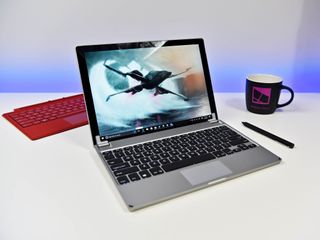
Microsoft's Surface product line has grown over the years to meet the various demands of consumers. For those who own a Surface Pro 3, Pro 4, or new Surface Pro however, you may be interested in innovative ways to expand its form factor. Or maybe you just really want a Surface Book, but can't afford it now.
The Brydge 12.3 Bluetooth keyboard is one possible solution that turns your Surface Pro into more or a laptop. I was skeptical of such a device, but after spending a few weeks with it, I'm (mostly) impressed. Here is what I like, and what I don't.
How it works
The Brydge 12.3 is a standalone Bluetooth 4.0 keyboard that has its own battery and costs $150. Micro USB charges it, and it should last around three months on a single charge. Obviously, that can vary, but the Brydge 12.3 should last at the very least weeks even with extreme usage.
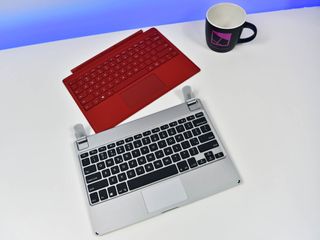
You just pair the Brydge 12.3 to the Surface Pro 3 or 4 using Windows 10 and the Bluetooth configuration.
Next, you slip the Surface Pro into the shims at the edge. They are quite firm, and it requires pressure to slide in the Surface Pro. The good news is that means the Surface Pro will not slip out. The unwelcome news is this is not something you want to have to do repeatedly, so the setup presumes you'll leave the Surface Pro in the Brydge for extended durations. If you must separate them, you just tug.


Once paired the Brydge 12.3 acts just as a keyboard, and it makes the Surface Pro feel like a laptop.
Get the Windows Central Newsletter
All the latest news, reviews, and guides for Windows and Xbox diehards.
Brydge 12.3 features and quality
Made from an all-aluminum chassis, the build quality is excellent on the Brydge 12.3.
Out of the box, the Brydge 12.3 is configured for the Surface Pro 4/Surface Pro, but there are extra shims in the box that fit the Surface Pro 3.
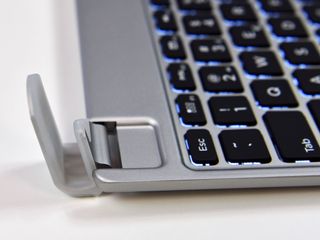
The Brydge 12.3 works with the all-new Surface Pro (2017), as well.
Everyone I showed it too was impressed with how durable and stable it feels. Part of that is the weight, which is 1.4 pounds (652 grams). That means you are effectively doubling the weight of your Surface Pro.
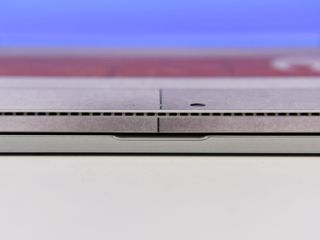
The reason for the weight is just physics. To prop the 1.7lb Surface Pro up into a laptop mode without the kickstand, you need similar weight to offset it. The Brydge 12.3 opens to a maximum of 160 degrees much like a "real" laptop.
The Brydge 12.3 is also the same diameter as the Surface Pro. It feels like squishing two Surface Pros together.
To be fair, it all feels very dense, robust, and even rugged. But your light Surface Pro becomes a heavy laptop weighing 3.41 pounds (1.55 kg). That's a significant tradeoff.
The Brydge 12.3 keys are chicklet-style with plenty of travel. I enjoy the way they depress and feel. They also support three-stage backlighting, which is a very nice touch. Part of the extra weight of the Brydge 12.3 goes to an internal battery for the Bluetooth and to also power the backlighting.
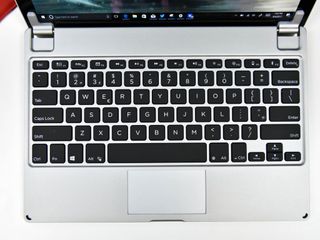
The Brydge trackpad is smaller than that of the Surface Type Cover. It's glass and while not Precision (so it doesn't support all Windows 10 gestures) it is better than average.
However, when you close the Surface Pro on to the Brydge, you need to hit the power button the Surface Pro to turn it off. There is no way for the Brydge to know your Surface is off because unlike the Type Cover, it is not physically connected.
If you open the Surface Pro and hit the power button, the Brydge automatically pairs again. The process is fluid and fast requiring no wait times so you can dive into work.
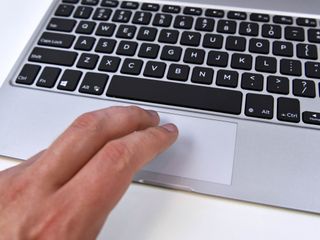
Unfortunately, you cannot use the Brydge 12.3 to charge the Surface Pro as an extended battery.
Overall, I was way more impressed with the Brydge 12.3 than I was expecting to be. The build quality is fantastic, the Bluetooth worked, the keyboard feels right, the backlighting is great, and the trackpad is OK.
Some issues with typing
My biggest complaint with the Brydge 12.3 is with typing. While it felt great, I often missed keystrokes. That may be related to how fast I type – average around 60 words per minute – because typing more slowly seemed fine.
The issue is likely to do with the Bluetooth, and the keyboard may be bad at keystroke-timing crossover so that the key needs to fully "clear" the movement before it registers. On average, it happened about every ten or twenty words, which while not awful, was enough to make me frustrated on occasion.
Brydge 12.3 Pro 128 adds optional SSD to your Surface Pro
In another oversion - Brydge 12.3 Pro 128 – you can get 128GB high-speed (600mbps) SSD storage built into the keyboard. That option will double the cost of the Brydge 12.3 to $299.
It connects via the micro USB port to the Surface Pro's USB Type-A one through an included mini-cable. While perhaps a bit clumsy, I must admit the idea is intriguing.
Conclusion: Almost worth it
I expected to dislike the Brydge 12.3 for Surface Pro but came away awestruck. The overall quality is fantastic, and Brydge gets a lot right with the device.
The added weight and size is something to note, but it at least feels good to carry and use.
The typing experience is great even though I missed a keystroke on occasion, which is the real bummer here. I think slower typists will be OK, but those who type like pros will get frustrated quickly. I also don't love the smaller trackpad.
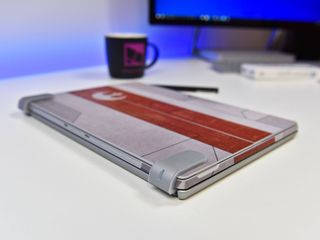
The $150 price is a bit high, too. Considering, however, that a new Surface Type Cover (non-Alcantara) costs $129, I think Brydge is in the ballpark. At the very least, the packaging and build quality all make it feel premium and worth the money. Nothing feels cheap about the Brydge 12.3.
Brydge 12.3 is worth checking out if you want this setup, but you may want to wait until the next version. With a few refinements, this could be a killer accessory.
Pros:
- Excellent build quality and design.
- Really nice keyboard response and feel.
- Backlit keys look great.
- Makes the Surface Pro more laptop-like.
Cons:
- Doubles the weight and size of Surface Pro.
- Occasional missed keystrokes when typing fast.
- Trackpad is a bit too small.

Daniel Rubino is the Editor-in-chief of Windows Central. He is also the head reviewer, podcast co-host, and analyst. He has been covering Microsoft since 2007, when this site was called WMExperts (and later Windows Phone Central). His interests include Windows, laptops, next-gen computing, and watches. He has been reviewing laptops since 2015 and is particularly fond of 2-in-1 convertibles, ARM processors, new form factors, and thin-and-light PCs. Before all this tech stuff, he worked on a Ph.D. in linguistics, watched people sleep (for medical purposes!), and ran the projectors at movie theaters because it was fun.